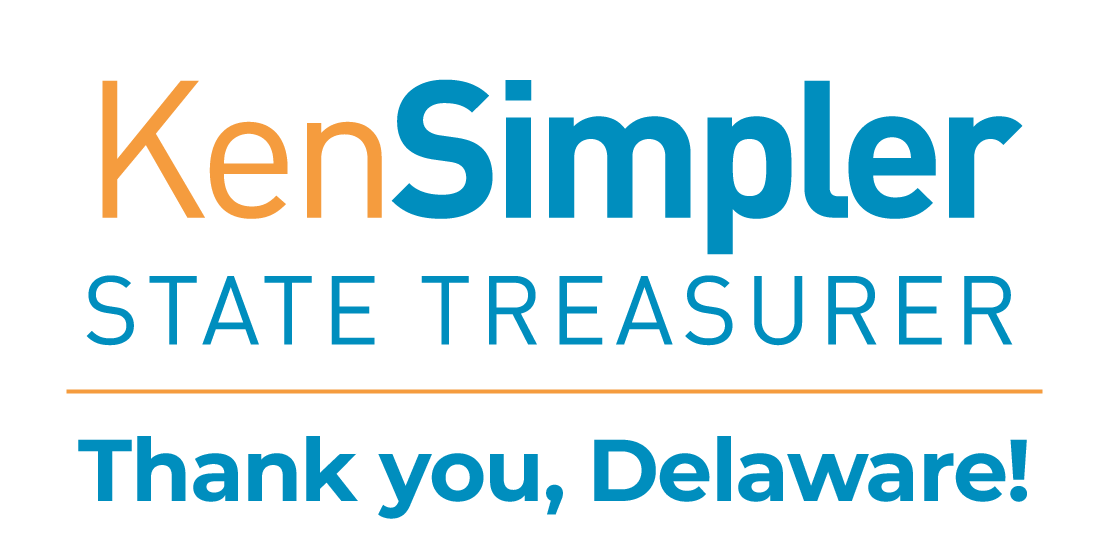First (and Lasting) Impressions: My First 100 Days As State Treasurer
Last week I had the invitation to sit down in studio with a media outfit to interview me on my first 100 days in office. The segment was less than 20 minutes but the interviewer was sharp and we did cover quite a few topics. I don’t know that we broke any new ground, but one exchange stuck out.
The interviewer clearly came to the table poised to elicit some strong reaction from me on the most recent downward revision of Delaware’s revenue projections by $45 million. How would the state handle this “collapse?” Not really rising to the bait, I suggested three things: one, the act of forecasting is just that and there are still more forecasts to come; two, the budget director has means of “finding” revenues as the legislative session comes to an end that tend to mitigate shortfalls of manageable amounts; and third, the magnitude of the problem should be borne in mind — $45 million in the context of total spending north of $8 billion is not insignificant, but it is only about ½ of 1%. Not exactly a calamity.
I tried to pivot from this exchange to talk about the important work going on at the Advisory Council on Revenues, a committee designed to study our entire revenue portfolio and ask important questions about the adequacy and predictability of our tax base, as well as the economic competitiveness of the way we choose to raise our money, in all cases over the long term. The interviewer wanted none of it. He took this opportunity to pounce: “Well, $45 million is sure a lot of money to the people who might have programs cut. You politicians like to talk about the long term, but what do you tell the people who are losing their funding.”
What I wanted to say is that any government that can’t figure out how to address a .5% budget shortfall has bigger problems. And, I would have liked to have added that there is far too little talk of the long term and far too much focus on the short term. But, I bit my tongue, and patiently repeated the answer I had given previously. To be honest, I wasn’t that engaged and I had a whole afternoon to come of meetings and what I thought were more pressing concerns.
Writing now, however, I realize I made a mistake. No matter the venue or the moment, I have to use every opportunity I get to bring this dialogue back to the big picture and the long term. The obsession with (yes, I’ll say it) the “small stuff” and the short term is really what is killing us. Politics, and sadly governing, is to a large degree a tyranny of the “now.” Lacking a fiscal framework that is holistic and long term leads to a lot of time being spent managing problems as opposed to solving them. These efforts are made in good faith and often with sincere intent, but over any span of time they end up looking like band-aids, patches or, worse, punts.
This is why I think the work of the Advisory Council on Delaware Revenues is important. And, don’t be too cynical. Notwithstanding it’s name, this is not the Advisory Council on Raising Delaware Taxes. The mission instead is to consider the historic performance of our revenue base (40 years worth) and ask some basic questions:
- Is the natural growth in our tax base slowing?
- Has our tax base become too reliant on unpredictable sources of revenue?
- Can the manner in which we raise money be made more “pro-growth”?
Now, I am not going to pre-empt the work of the Council by providing you with my view on these issues at this time. That will be the job of a future newsletter. Instead, I simply want to point out that these are the types of long-term, large-scale issues that we need to address, discuss and resolve. The output of this Council should ideally inform both the members of our General Assembly and our state as to the way to think about our revenue system so that a framework can be devised and agreed upon that eliminates some of the “adhocracy” of our budgeting process and allows us to solve today’s problems in a manner that will not create tomorrow’s crises. That’s what a good finance system does.
In addition, I expect the Council or some body formed to continue the work started by the Council to dive into the other part of the “value equation” and offer structural recommendations as to how we avoid common budget traps. In the first instance, note that there is too much fussing over how much spending or taxing and not enough discussion about the value we get out of the spending of our tax dollars. I’ve said many times that even the conservatives I know will accept a good value out of government. What should worry us all is when we spend a relatively high amount and get a relatively mediocre outcome. That’s trouble and that’s where we are now.
In the second instance, I hope that we undertake a rigorous overhaul of our “structural fiscal governors.” In theory, these are the procedures, practices and protocols that are statutorily or constitutionally built into our finance system that recognize our proclivity toward poor fiscal practices and preclude behaviors such as spending more when we have more (instead of saving for a rainy day) and putting off capital investments and foregoing funding long-term liabilities (in favor of current programs and transfers). We have many such “fiscal governors” but over time they have ceased to be as effective as they once were and some have been deliberately “worked around.” It’s time to take up consideration of a new financial framework that addresses these shortcomings and provides greater long-term discipline.
By this time, I am sure I have you worried that I am spending too much time on esoteric financial designs that while well-intentioned will never see the light of day in our political grinder in Dover. Perhaps, but ideas have a way of purposing themselves when they are needed most. To have a chance at putting them to work we first at least need to conceive and design the systems that will lead to greater transparency, accountability and certainty in how we do finance. That may be a push, but I’m eager to put a shoulder into it.
Also, take comfort that I am allocating the lion’s share of my days to the actual functionings of the Office of the State Treasurer. I have embraced the idea that I must act and learn on two paths, idiosyncratically and systemically. While I am immersed in banking service RFPs, revisions to the guidelines of our state investment portfolio, redesign of our state employees deferred compensation plans and a myriad of daily operational matters, I have an outside consultant rigorously reviewing and mapping our office’s workflows and work product. If all goes as planned, she will complete her analysis in tandem with the conclusion of the fiscal year, leaving me a few summer months after the General Assembly goes home to study her recommendations and make decisions for next fall’s budget proposal that takes this analysis into account.
Whether inside the office or outside, I am committed to the idea that reforming our government to be more productive and create more value requires studying our systems and taking a long-term view. If I can’t lead on those ideas through my committee work, I sure intend to lead in the Treasurer’s Office by example!
So, let me conclude with two final examples from my first 100 days to convince you that planning and fiscal discipline over the long-term matter. These come from two very different sources: state employee benefits and charter schools. In both cases, however, the lesson is clear: operating year-to-year and “getting by” is distinctly different than being disciplined and taking the long view. The latter approach creates value; the former approach creates problems. I think you’ll agree.
Case 1: Charter School Losses Compound
A private company engaged to run one of our state charter schools was not paid for management services over a period of years and was granted an award of nearly $1,000,000 in 2008. This verdict was affirmed by our Chancery Court in 2010 with interest on the bulk of the judgment granted at a rate of 18% until paid in full. Seven years later, no amounts have been paid on the award, and I sit now with an order of a Dover superior court to identify all monies of the school under the control of my office and conserve them for the potential benefit of the creditor. Interest alone now exceeds the amount of the original claim. Subject to the results of an objection that we have filed, I may be left to either disobey a court order or suspend the activities of an operating school for lack of funds. To date, I have received no credible explanation as to how such a situation could have been left to fester for the better part of a decade into such an awful mess.
Case 2: Health Fund Founders
The health fund that pays all self-insured claims of state employees is scheduled to begin the next fiscal year with no reserves and insufficient assets to meet its forecasted liabilities. Fewer than three years ago, the plan boasted a reserve of more than $70 million and surpluses of nearly that amount again on annual expenditures of roughly $600 million. This rapid reversal reflects a conscious decision during the intervening period to stop raising health care premiums during a stretch of below average claims experience. The monies that would have been transferred to the health fund were left to support other general fund expenses of our state government. Employees now face a raft of plan cuts and/or the General Assembly must find at least $60 million this year just so we can muddle through. There’s more to this tale, but suffice to say there’s not likely to be any happy ending.
These examples beg the question of our capacity to consistently show long-term fiscal discipline and to address situations unlikely to end well in the “out years” proactively, when they are most manageable during the “in years.”
Good finance is good government. And my mission.
Yours,

Keep up with Ken on social media.
Copyright © 2018 · Paid for by The Simpler Campaign, LLC, PO Box 9233, Newark, DE 19714
